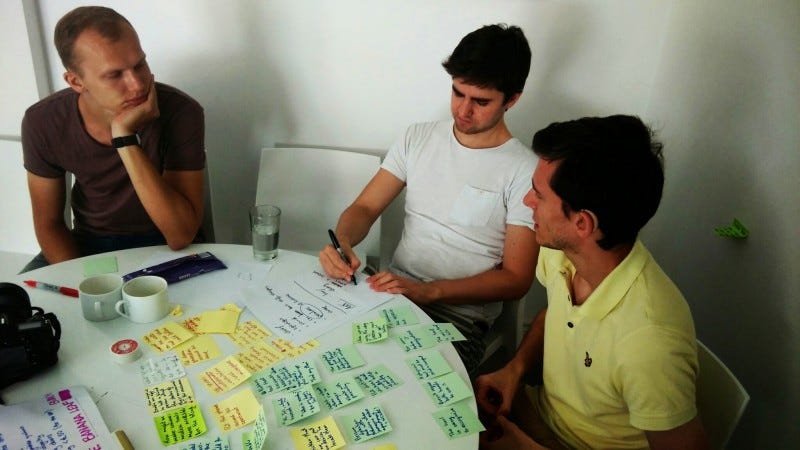99% of my ideas are rubbish
Let’s face it: we have more ideas in our head than we have time in our lives. And most of the ideas, although they may sound exciting and groundbreaking at first, end up being abandoned.
That’s ok!
During the course of a day, I tend to jot down about 2–3 new ideas in a note-taking app such as Clear. Then they usually sit there for a while until I go through that list again. That’s something that usually happens on planes or some other place where I’m completely chilled (my fear of turbulences aside) and not easily distracted.

A screenshot of one of my Clear lists that I use to store blog post ideas
Since I keep all the possible ideas in one central place, I have the ability to go through each of them and decide what to do next. These are the two options I choose between:
- Commit to the idea, and take some follow-up action
- Remove it from the list and forget about it
Ideally, I can shrink down that list to 1 or 2 remaining items. But honestly that’s hardly ever the case. Because I tend to think that each idea is so precious and letting go of one means I’ll lose this opportunity forever.
That’s a bit of a misconception. First, an idea by itself doesn’t have any value in the world anyway. And second, good ideas will come back to you most of the time. So there is no need to worry.
The idea processing process
When you don’t allow yourself to let go of your weak ideas, you won’t be able to create the necessary time and space for the really good ones. For example if you have 25 ideas sitting on your list waiting to be executed, how can you expect to dedicate enough time to only one of them, so that it may eventually see the light of day.
Sometimes, we even become a bit obsessed with our own ideas. That’s normal–in the end they are creations of our own minds, so we treat and defend them like our children. I know this has been discussed a lot, but it’s worth reminding ourselves of this:
An idea alone isn’t worth a single penny. It’s actually much better to deliberately kill your darlings , and the emotional attachment you have to them.
Filter, share, and then trash them
As I mentioned in the little exercise before, it’s actually all about processing your ideas every once in a while and being very radical in the selection process, so that you end up with only a few ideas that get you excited.
But how do we know they’re the right ones?
That’s not so easy, to be honest:
- Gut feeling: Often enough, your gut has the right answer. Just by looking at something I jotted down, repeating it in my head and considering how I feel about it, can give me the answer straight away. This is actually the first instance filter that most ideas go through, and end up being trashed by.
- Sharing them: This is a more difficult one. Because when you share your idea with others, you give them the possibility to criticise, or even copy it. Usually though nobody is going to copy it, because people don’t have the time, resources, or even the motivation to do so. And if you’re really convinced about your idea, you have to be prepared for criticism anyway. If you’re willing to defend your idea from negative feedback from others, it may be a sign you truly believe in it.
- Validating them: Once you’ve gathered some insights by seeing your idea through other people’s eyes, why not elaborate on it a bit further and build a little prototype? This can be really low level and only has to visualize what you’ve imagined. But it really helps you to understand how others perceive the thing you have in mind and how they would interact with it.

That’s me at an internal workshop sharing ideas with my team mates Arnas and Jon
Ideally, the people you tell about your ideas are not your best friends or family, because they tend to not tell you the truth when it might hurt your feelings.
Create a lot, but discard even more
More often than you think, it’s not just about creating and ideating ideas. It’s about filtering and discarding the weaker ones to significantly increase focus on the good ones.
That’s great because it allows you figure out and accept early in the process that working on something may or may not be worth the effort. And who wants to spend time on ideas that are not going to cause a significant, positive change in your life?
Ultimately, your stream of ideas is not going to run dry. But the time that you waste on bad ideas is what might eventually drain your energy resources, because 99% of your ideas are rubbish.
Originally published on Medium on July 27, 2015.